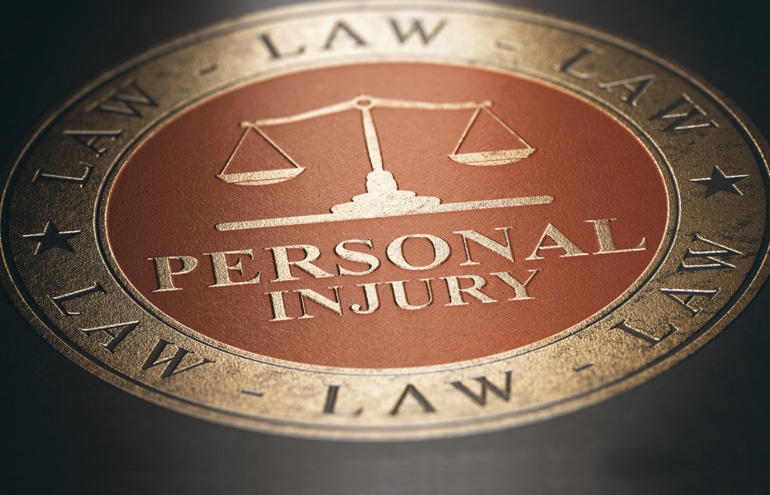The legal profession offers numerous specialization opportunities. A personal Injury attorney is a trial lawyer who advocates for injured persons when they need help. Becoming a personal injury attorney requires at least seven years: four years for a bachelor’s degree, three years of law school, plus passing the bar exam and getting hired and trained by a law firm.

Table of contents
- What Are the Steps to Becoming a Personal Injury Lawyer?
- How Do You Complete Your Legal Education Successfully?
- How Do You Pass the Bar Exam?
- Internship, Mentorship and Sponsorship Opportunities
- How Do You Start Your Career at a Personal Injury Law Firm?
- Why Is Personal Injury Law Rewarding?
- What Challenges Should You Expect in Personal Injury Practice?
- FAQ Section
- Take the First Step Toward Your Personal Injury Law Career
Personal injury law offers the potential for significant financial rewards and professional fulfillment. First, aspiring PI attorneys must navigate a comprehensive educational and professional journey. This guide will help you understand the path to becoming a successful PI attorney, from undergraduate studies through law school, and through establishing a thriving PI practice.
What Are the Steps to Becoming a Personal Injury Lawyer?
The process involves four main steps: 1) Earn a bachelor’s degree, 2) Complete law school, 3) Pass the bar exam, and 4) Gain practical experience in a personal injury law firm.
The journey to practice personal injury law generally follows a structured progression. Each step builds essential knowledge and skills required to represent clients effectively. Legal professionals must complete state-specific educational requirements before practicing law independently.
The process typically spans seven to eight years of education and training. However, most (approximately two-thirds) law school applicants take a year or two between earning their undergraduate degree and law school to work in a law office and save money for school.
Ongoing professional development continues throughout a lawyer’s career. Most states require lawyers to earn and report a minimum number of continuing legal education credits to maintain their license. Only five states — Michigan, Massachusetts, South Dakota, Maryland, and Washington, D.C. do not have mandatory continuing legal education requirements (MCLE).
What Bachelor’s Degree Do You Need for Law School?
Any bachelor’s degree qualifies for law school admission, but certain majors will better prepare you. Maintaining a high GPA above 3.5 strengthens law school applications significantly.
A bachelor’s degree serves as the foundation for legal education. No specific pre-law major is required by accredited law schools. However, certain fields provide valuable preparation for future legal practice. Popular undergraduate majors include:
- Political science (develops understanding of government systems)
- Business (builds analytical and communication skills)
- Journalism (strengthens writing, research skills and critical analysis)
- Criminal justice (provides legal system familiarity)
As an undergraduate student, focus on courses that enhance critical thinking skills and analytical reasoning, along with courses that prepare you to review and digest large amounts of material quickly. Logical reasoning skills are essential for law school. For practical experience, consider joining your debate team, applying for internships with legal organizations, and doing advocacy volunteer work.
How Do You Choose a Law School?
Select an ABA-accredited law school with strong personal injury programs and reasonable tuition costs. Selecting the right law school requires careful consideration of multiple factors. ABA-accredited law school programs meet rigorous educational standards. These schools qualify graduates to sit for the bar exam in most jurisdictions.
The law school admission test (LSAT) is a critical application component. The LSAT is a standardized test measuring reading comprehension, analytical reasoning, and logical reasoning skills. Achieving a target score above 160 greatly improves admission chances at top-tier law schools.
Students should consider the following factors when selecting a law school:
- Tuition costs and financial aid availability
- Personal injury law curriculum strength
- Bar passage rates (target schools with 85%+ rates)
- Employment statistics for graduates
- Geographic location and regional connections
- Hands-on clinics
- Practice management and technology courses
Law school is a huge commitment. It can be useful to take a year or two between undergraduate school and law school to work in a personal injury law firm to see if it is really for you. Many Plaintiff’s PI firms are small and continuously looking for help.
Attending law school represents a significant financial investment. Average (annual ) law school tuition ranges from $28,000 annually for in-state public schools to $52,000 for private institutions.
How Do You Complete Your Legal Education Successfully?
Law school requires three years of full-time study covering foundational law courses and specialized personal injury training.
Law school provides comprehensive legal education covering fundamental principles (in the first year and the opportunity to hone in on specific practice area in the second and third years)and specialized practice areas. The curriculum balances theoretical knowledge with meaningful opportunities for hands-on experience in student-run legal clinics. Clinical programs, externships, and moot court competitions are wonderful opportunities for law students to develop practical skills.
The first year covers foundational subjects. Constitutional law, contracts, torts, and civil procedure (and property) establish the groundwork for understanding legal principles. These courses are mandatory for all law student participants. (Many law schools also require legal writing for one L’s, and some require legal writing courses throughout law school.)
Upper-level courses allow focus on personal injury-specific areas. Tort law forms the core foundation for personal injury practice. This course covers negligence theories, liability standards, and damage calculations.
Course requirements include:
- Trial advocacy (develops courtroom presentation skills)
- Evidence (rules for presenting medical records and expert testimony)
- Negotiation (essential for settlement discussions)
- Professional responsibility and ethics
- Alternative Dispute Resolution (mediation, arbitration and other resources for out-of-court settlements)
What Are the Essential Law School Courses for Personal Injury Practice?
Focus on tort law, civil procedure, evidence and trial advocacy courses.
Tort law forms the core of personal injury education. This course is part of the foundational curriculum covering negligence theories and liability standards. Understanding tort law principles is crucial for building successful personal injury cases.
Civil procedure teaches litigation rules from filing through trial — the procedural requirements that protect client interests throughout the legal process.
Evidence law covers rules for presenting medical records and (witness and ) expert testimony in court.
In addition, PI attorney Justin Eisner recommends prospective PI lawyers focus on elective courses in medical malpractice and product liability, as well as insurance law courses, which help prepare young lawyers for dealings with insurance companies. These specialized courses directly apply to personal injury practice areas.
How Do You Pass the Bar Exam?
The bar exam requires months of intensive preparation and covers multiple subjects, including tort law and civil procedure.
The bar examination represents the final licensing hurdle. Each state administers its own state bar exam with specific requirements. Passing standards vary by jurisdiction but typically require 65-70% correct answers. Aspiring lawyers must also pass a character and fitness investigation, which is conducted by the state licensing entity.
Most jurisdictions use the multistate bar examination (MBE) as a component. This standardized exam covers constitutional law, contracts, criminal law, evidence, real property and torts. The MBE consists of 200 multiple-choice questions administered over two sessions.
Bar exam components may also include:
- Multistate bar examination (MBE) – 200 multiple-choice questions
- Multistate performance test (MPT) – practical lawyering tasks
- State-specific essay questions
- Multistate Professional Responsibility Examination (MPRE) – ethics test
The multistate performance test evaluates practical lawyering skills. Candidates must analyze documents and draft legal memoranda under time constraints. This component tests real-world attorney responsibilities.
Preparing for the bar exam requires months of intensive study and taking commercial review courses. Success depends on consistent preparation and a thorough understanding of substantive law.
Internship, Mentorship and Sponsorship Opportunities
Throughout undergraduate and law school, it is important to seek out mentors who can guide you through the process of becoming a successful attorney and help you focus on the type of lawyer you want to be. Most law firms have at least informal mentorship or sponsorship programs, but seeking guidance from mentors should begin as early as high school.
Read: “New Lawyers Should Have More Than One Mentor” by Attorney at Work contributor and law school professor Amy Timmer, author of the book “60-Minute Mentoring for Law Students and Lawyers.”
How Do You Start Your Career at a Personal Injury Law Firm?
Begin as an associate attorney at personal injury firms, earning $60,000-$80,000 annually while gaining experience under supervision.
New attorneys typically begin as associates working under experienced attorneys. This supervision helps young attorneys develop skills while building client relationships.
Large and mid-size firms offer different advantages. Larger firms provide more resources and training programs, while smaller practices offer greater hands-on experience and direct client interaction opportunities.
Starting attorney responsibilities may include:
- Case file management and organization
- Legal research and memorandum drafting
- Client communication and intake
- Document preparation and filing
- Administrative tasks and case coordination
While new attorneys are not usually expected to bring in new clients, success in personal injury practice relies heavily on reputation and referral relationships. It is wise to begin building a professional network immediately upon entering practice, including working to develop interpersonal and communication skills.
How Do You Specialize in Car Accidents and Personal Injury Claims?
Car accident cases require specific knowledge of traffic laws, insurance regulations and medical injury documentation.
According to the National Highway Traffic Safety Administration, car accidents represent approximately 50% of personal injury cases. These cases require specific knowledge of traffic laws and accident reconstruction techniques, and attorneys must understand how to investigate accidents effectively.
Working with medical records requires special training in healthcare systems. Medical treatment documentation is essential for establishing injury severity. Attorneys must learn to interpret medical reports and work effectively with healthcare professionals.
Personal injury claims involving severe injuries require an understanding of long-term care needs. Calculating damages includes medical expenses, lost wages, and pain and suffering. High-stakes cases often involve multiple parties and insurance carriers.
Insurance companies play a central role in settlement negotiations. Understanding coverage limits and policy language is crucial.
Personal injury attorneys should develop knowledge in the following:
- Traffic law and accident reconstruction knowledge
- Medical terminology and injury assessment skills
- Insurance policy interpretation abilities
- Damage calculation methodologies
- Negotiation and trial advocacy skills
Why Is Personal Injury Law Rewarding?
Personal injury law offers high earning potential ($100,000-$500,000+ annually) while helping injured people obtain justice and fair compensation.
Personal injury law offers unique opportunities to make meaningful differences in clients’ lives. This practice area is incredibly rewarding both financially and professionally. Attorneys help injured individuals obtain fair compensation for their losses.
Achieving justice for clients provides deep professional satisfaction beyond financial rewards. Personal injury attorneys serve as advocates for individuals facing powerful insurance companies. This advocacy role creates a significant impact on clients’ lives and recovery.
The contingency fee basis used in most personal injury cases aligns attorney and client interests. Attorneys receive compensation only upon successful case outcomes. This structure motivates achieving the best possible results for clients.
Financial recovery potential in personal injury law can be substantial. According to the Bureau of Labor Statistics, experienced personal injury attorneys earn median salaries of $126,930 annually. Top practitioners at successful firms earn $300,000 to $500,000 or more.
Does Personal Injury Law Offer Career Advancement Opportunities?
Career growth opportunities in personal injury practice include starting and building your own personal injury law firm and working toward a specialization in areas like medical malpractice.
- Advancing from an associate to a partner in an established law firm typically takes five to seven years and requires demonstrating competence as an attorney and the ability to attract new clients. Partner positions may be non-equity, salaried, or a full equity partnership in which partners contribute capital to the firm and share profits.
- Many PI attorneys eventually establish their own law practices, alone or with partners, seeking autonomy over the cases they work, flexibility and greater earning potential.
- Practice specialization within personal injury law allows lawyers to focus on specific case types. Medical malpractice, product liability, and wrongful death represent lucrative specialization practice areas. Attorneys who limit their practice to certain areas of personal injury law often develop expertise that leads to higher compensation and professional recognition.
Whichever path you choose, career growth and success will depend on honing your case management and trial skills, building strong client relationships, and learning to develop business.
Professional development and business development opportunities include:
- Taking continuing legal education courses
- Attending industry conferences and trade events
- Volunteering in state, local or national bar association groups, and participating in bar leadership
- Maintaining trial lawyer organization memberships
- Volunteering in your community
- Attending business networking events
What Challenges Should You Expect in Personal Injury Practice?
Much has been written about the stress, burnout and addiction problem in the legal profession. Personal injury attorneys are especially vulnerable to the emotional stress, long work hours and intense competition for cases.
Emotional distress and vicarious trauma from client situations is not uncommon — personal injury practice involves working with clients experiencing trauma and significant life challenges. Maintaining healthy boundaries requires strong emotional intelligence and stress management skills.
Long hours characterize much of personal injury practice. Trial periods and settlement negotiations create high-pressure situations. According to the American Bar Association, personal injury attorneys average 50-60 hours per week during active case periods.
In addition, the highly competitive nature of personal injury practice requires continuous marketing efforts. Building and maintaining a successful practice demands both legal and business skills.
Multiple cases with varying deadlines require excellent organizational abilities.
Common practice challenges include:
- Managing client emotional needs and expectations
- Balancing caseload demands with quality representation
- Competing with established firms for referrals
- Maintaining work-life balance during trial periods
- Adapting to changing legal and medical standards
What Ethical Standards Apply to Personal Injury Practice?
Individual state bar organizations establish and enforce ethics rules and issue professional conduct guidelines and standards. Like all U.S. lawyers, personal injury lawyers are bound by their state bar ethics rules, which are based on the American Bar Association Model Rules of Professional Conduct.
Ethics rules in personal injury practice govern attorney-client relationships and professional conduct, including client confidentiality, conflicts, advertising and marketing, technology competency, and honest fee disclosures.
Violations can result in disciplinary action, including license suspension or disbarment.
Each case brings its own set of ethical considerations. Conflicts of interest, communication requirements, and professional competence standards apply. Attorneys must recognize and address these issues proactively to avoid violations.
Professional responsibility extends beyond individual cases to include obligations to the legal profession. Personal injury attorneys serve important societal functions requiring adherence to high ethical standards. Regular ethics training helps attorneys navigate complex situations effectively.
FAQ Section
How much do most personal injury attorneys make?
Salaries for entry-level lawyers range from $60,000-$80,000, depending on the size of the firm and geographical location. Experienced PI attorneys may earn between $200,000 and $500,000+. Again, salaries vary by location, firm size, and case success rates.
How much do personal injury law firms earn on contingency cases?
33%-40% of settlement/judgment amounts. This contingency fee percentage varies based on case complexity and trial requirements.
External Citations:
- Bureau of Labor Statistics Lawyer Salary Data: https://www.bls.gov/ooh/legal/lawyers.htm
- American Bar Association Career Resources: https://www.americanbar.org/groups/legal_education/resources/careers/
Take the First Step Toward Your Personal Injury Law Career
The path to becoming a successful personal injury attorney requires dedication and comprehensive education. Each step builds toward practicing law and serving clients effectively. Success depends on strong foundational knowledge, practical skills, and unwavering commitment to ethical standards.
Start by researching accredited law schools with strong personal injury programs. Prepare for the LSAT and maintain strong undergraduate grades. Your journey to achieving justice for injured clients begins with taking the first step toward your legal education.
For insights from a practicing personal injury attorney, read the “Life in the Law” column on Attorney at Work, including “Is a Career in PI Law Right for You?”
Image © iStockPhoto.com.

Sign up for Attorney at Work’s daily practice tips newsletter here and subscribe to our podcast, Attorney at Work Today.















